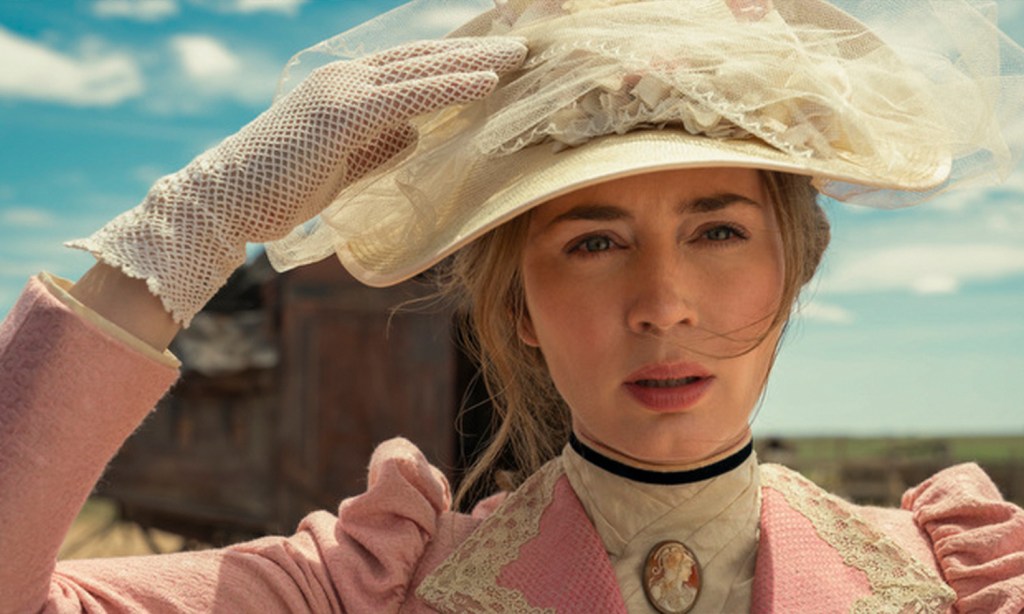Westerns are an aggressively masculine genre, both in the stars who lead them and the characters they portray. Clint Eastwood, perhaps the most masculine Western star of all, described the genre as “the last masculine frontier,” where men can survive alone, free of the trappings of modern society. But in Prime Video’s new series The English, Emily Blunt and Chaske Spencer rewrite the genre into something that’s full of violence and outsiders, but also love, friendship and power.
Blunt plays Lady Cornelia Locke, an Englishwoman who arrives in Oklahoma with a bursting bag of cash and a simple plan: revenge. Spencer plays Eli Whipp, a Pawnee ex-cavalry scout who left his tribe to serve in the army and now isn’t welcomed by either group. After being betrayed by a merciless (also sexist, also racist) hotelier, Cornelia and Eli find themselves travelling together.
Eastwood’s full quote is: “Westerns. A period gone by, the pioneer, the loner operating by himself, without benefit of society. It usually has something to do with some sort of vengeance; he takes care of the vengeance himself, doesn’t call the police. Like Robin Hood. It’s the last masculine frontier. Romantic myth. I guess, though it’s hard to think about anything romantic today. In a Western you can think, Jesus, there was a time when man was alone, on horseback, out there where man hasn’t spoiled the land yet.”
All of these tropes are present in The English, except they’re experienced through a feminist lens in Cornelia and a Native American lens in Eli. They’re loners, shunned by society for being a woman and a Native American; Cornelia is on a quest for vengeance that Eli is inspired to help her complete; and the Oklahoma plains are just beginning to be industrialised by white people.
Ahead, we’ve broken down the other Western tropes that The English cleverly subverts, and even a few classics that the show leans into for dramatic effect.
The Gunslinger
A classic Western character, the Gunslinger is the hero of the story and they have preternatural skill with a rifle or their trusty revolver. In The English, Cornelia is the gunslinger, showing deadly aim with a bow and a rifle — odd for someone raised in the English nobility.
When she and Eli team up, she reassures him that she can shoot “if [she has] to.”
“Oh, you’ll have to,” he tells her knowingly.
Cornelia is dogged in her quest to get revenge for the death of her son. And at the times when Eli is content to let things play out without getting involved, Cornelia is the one who takes the shot.
The Noble Savage
This character belongs to a savage tribe but is revealed to be more noble than their white counterparts, especially if they’re in tune with nature. Eli is introduced when he stops a group of soldiers from killing a Native American couple — not by killing the soldiers but by telling them to stop, which works, because he’s wearing his military uniform. The message is clear: Eli is no noble savage. He uses violence as a tool to survive, but he never seeks it out.
The Noble Savage trope is usually handled in one of two ways: either life is hard and the savage earns their nobility through hard work, or they’re content with what little they have and their nobility is innate. Eli is neither. He wants to claim a plot of land under the Homestead Act, which gave veterans a home in recognition of their service, but he’s continually told “that ain’t for” him because of the colour of his skin. He’s also not welcome by his tribe because of his military service.
Eli is a contradiction, a jumble of loyalties. “Just you remember,” he’s told by another soldier before leaving the army for good. “In there you’ve been one of us, but out here you’re one of them.”
Quest to the West
This trope signifies the beginning of a character’s adventure or their journey to start a new life. They’re usually trying to rebuild after a series of mishaps or running from a problematic past, but Cornelia’s Quest to the West is driven singularly by her quest for revenge — even though the details about why she wants revenge are kept a secret until the end.
Other characters have come to America for more traditional quests. Thomas, an Englishman with a mysterious connection to Cornelia, came to raise cattle, while a group of Mennonites see farming as looking after God’s land. But for Cornelia, America is only home to the justice that can help her move on, and her quest has a definite end. Driven by emotional performances by Blunt and Spencer, The English is a tense and thrilling drama that all Western fans should put on their To-Watch list — for the way it cleverly subverts the genre and its tender and personal story.
The English is now streaming on Prime Video. Start your free 30-day Prime Video trial today.
Read more stories from The Latch and subscribe to our email newsletter.

